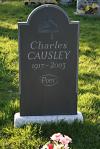Biography
Other info : Bibliography
Charles Stanley Causley, CBE, FRSL
was a Cornish poet, schoolmaster and
writer. His work is noted for its simplicity and directness and for its
associations with folklore, especially when linked to his native Cornwall.
Causley was born at Launceston in Cornwall and was educated there and in Peterborough. His father died in 1924 from long-standing injuries from the First World War. Causley had to leave school at 15 to earn money, working as an office boy during his early years. He served in the Royal Navy during the Second World War, as a coder, an experience he later wrote about in a book of short stories, Hands to Dance and Skylark. His first collection of poems, Farewell, Aggie Weston [1] (1951) contained his "Song of the Dying Gunner A.A.1":
Farewell, Aggie Weston, the Barracks, at Guz,
Hang my tiddley suit on the door
I'm sewn up neat in a canvas sheet
And I shan't be home no more.
"Survivor's Leave" followed in 1953, and from then until his death Causley published frequently. He worked as a teacher at a school in Launceston, leaving the town seldom and reluctantly, though he twice spent time in Perth as a visiting Fellow at the University of Western Australia, and worked at the Banff School of Fine Arts in Canada, and especially after his retirement which taken early in 1976 [2] was much in demand at poetry readings in the United Kingdom. He made many broadcasts.
An intensely private person, he was nevertheless approachable. He was a friend of such writers as Siegfried Sassoon, A. L. Rowse, Jack Clemo and Ted Hughes (his closest friend). His poems for children were popular, and he used to say that he could have lived comfortably on the fees paid for the reproduction of "Timothy Winters.In 1958, Causley was made a Fellow of the Royal Society of Literature and was awarded a CBE in 1986. When he was 83 years old he was made a Companion of Literature by the Royal Society of Literature: he greeted this award with the words, 'My goodness, what an encouragement!' Other awards include the Queen's Gold Medal for Poetry in 1967 and a Cholmondeley Award in 1971. In 1973/74 he was Visiting Fellow in Poetry at the University of Exeter, receiving an honorary doctorate from that university on 7th July, 1977.[3] He was presented with the Heywood Hill Literary Prize in 2000. Between 1962 and 1966 he was a member of the Poetry Panel of the Arts Council of Great Britain. He was twice awarded a travelling scholarship by the Society of Authors. There was a campaign to have him appointed Poet Laureate on the death of John Betjeman, but to the people of his home town, he became "the greatest poet laureate we never had". He was interviewed by Roy Plomley on Desert Island Discs on 1 December 1979: his music choices included five classical selections and three others while his chosen book was Boswell's Life of Johnson.[4]
In 1982, on his 65th birthday, a book of poems was published in his honour that included contributions from Ted Hughes, Seamus Heaney, Philip Larkin and twenty-three other poets, testifying to the respect and indeed love that the British poetry community had for him. His work, influenced by W. H. Auden, is intensely original and many consider him to be, as Betjeman was, a man working outside of the dominant trends of the poetry of his day.[citation needed] Because of this, academia has paid less attention to his work than it might have done.[citation needed] His popularity, particularly among the Cornish, remains high.






